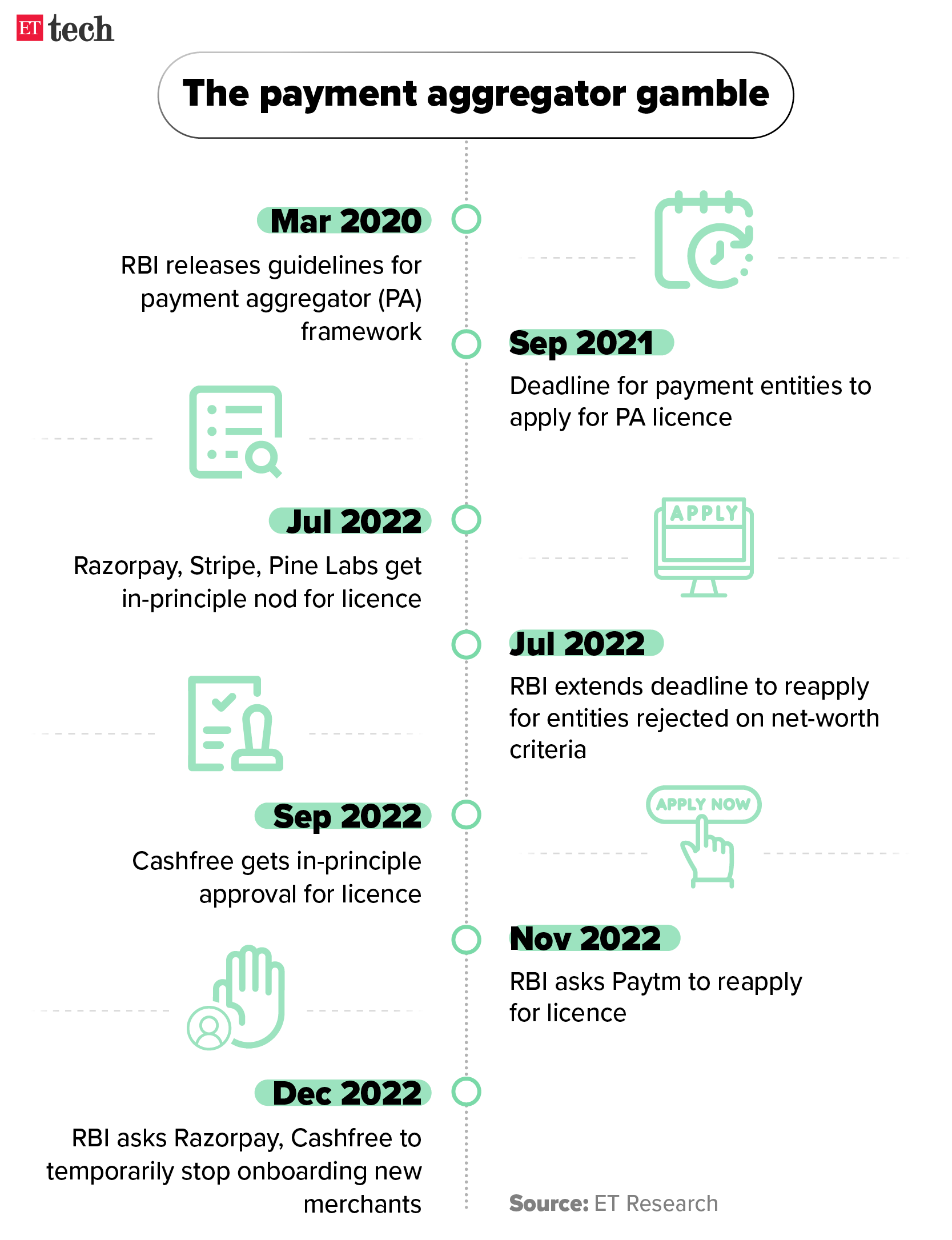RBI has also asked payment services provider Cashfree to stop self-onboarding services for its new merchants and step up checks, two people cited above said.
Razorpay, Stripe and Pine Labs
were granted in-principle approvals for payment-aggregator licences in July. In September,
Cashfree had also received an in-principle nod from the banking regulator for its payment-aggregator licence.
According to people aware of the matter, the central bank decision to pause merchant additions is linked to the payment-aggregator licences of these entities. Among the impacted firms, Razorpay is the biggest in scale. It is also the most valued Indian fintech firm — at $7.5 billion. Entities applying for a payment-aggregator licence have to undertake a system audit, including a cyber-security audit.
“Razorpay has received a notification earlier this week to submit a system audit report to the regulator. Once the RBI is satisfied with the findings, Razorpay can then start onboarding newer merchants,” one of the individuals aware of the RBI’s communication told ET.
System Audit Report
Discover the stories of your interest

Razorpay is expected to submit its audit report with the regulator by next week, one of the people cited above said.
Cashfree has also slowed down enterprise onboarding, for now, said one of the sources.
When contacted, a spokesperson for Razorpay confirmed the RBI directive. “As part of the process for the final authorisation of our PA/PG (payment-aggregator/payment gateway) licence for which we received the in-principle approval from the RBI in July, we are now required to share additional details with the RBI to aid in the final licence process.”
As part of this process, the RBI has suggested we temporarily withhold onboarding new online merchants until such details are submitted,” a spokesperson for the Bengaluru-based company said.
The company said this would have no impact on Razorpay’s existing business operations and current merchants.
“We continue to onboard new businesses on other Razorpay services — RazorpayX, Corporate Card, and Offline payments via Ezetap,” the spokesperson said, adding it remains fully compliant with regulatory guidelines and that the company continues to be in touch with the RBI for the next steps.
Multiple sources ET spoke with said the RBI is believed to have raised concerns with the US payments major Stripe’s local arm, suggesting it pause the onboarding of new merchants. However, the company denied receiving any such communication from the regulator.
“We haven’t received any communication from the RBI asking us to pause onboarding. We look forward to continuing to operate in India and help Indian businesses process their payments, support their subscription business models, and combat fraud,” said a Stripe spokesperson in response to ET’s queries on the matter.
Emails sent to Cashfree did not elicit a response until the publication of this report.
When contacted, a spokesperson of Pine Labs said it hasn’t stopped onboarding clients. “Our Plural payment gateway continues to remain compliant as per the PA /PG guidelines and we are continuing to onboard online merchants,” the company spokesperson said.
Why the Curbs?
PA licence guidelines require such entities to maintain escrow accounts, as opposed to operating nodal accounts.
“The existing entities can continue to maintain nodal accounts until they have been authorised by the RBI. Since the PA needs to move toward an escrow account, the bank and the PA may take a call about maintaining the same from an earlier date as well,” reads the central bank guidelines for payment aggregators and payment gateways as of March 31, 2021.
 ETtech
ETtechA source aware of RBI’s thinking said that after the in-principle nod, the regulator wants these entities to comply with the PA guidelines at the earliest, and onboard new merchants as per the new norms before the regulator gives the final licences.
A person cited above also added that other payment providers that have applied for the PA licence will have to go through a similar scrutiny, unless they are ‘completely compliant’.
Late November, the RBI had asked Paytm to reapply for a PA licence for its subsidiary, Paytm Payments Services, within 120 days, in response to its initial application. It also directed the payments firm to stop signing up new online merchants.
Other fintech firms that have received in-principle nods for PA licences include offline payment players Mswipe, Innoviti and neo-banking startup, Open.





